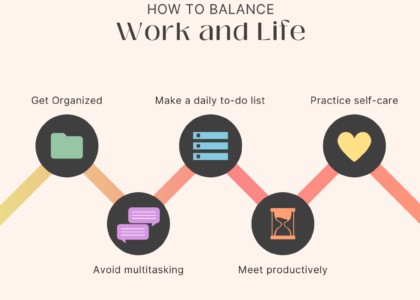In today’s fast-paced world, the workplace can be both a source of fulfillment and stress. With deadlines looming, emails flooding in, and the pressure to perform consistently, it’s easy for our mental health to take a toll. However, prioritising mental well-being is crucial for maintaining productivity, creativity, and overall happiness at work. Here are some practical ways to take care of your mental health at work:
- Set boundaries: Establish clear boundaries between work and personal life. Avoid checking emails or taking work calls outside of designated work hours. Setting boundaries helps prevent burnout and allows for much-needed rest and relaxation.
- Take regular breaks: Breaks are essential for maintaining focus and reducing stress. Incorporate short breaks throughout your workday to recharge. Whether it’s a quick walk outside, a meditation session, or simply stretching at your desk, taking breaks can improve concentration and productivity.
- Prioritise self-care: Make self-care a priority, both inside and outside of the workplace. Engage in activities that bring you joy and relaxation, such as exercising, practicing mindfulness, or spending time with loved ones. Investing in self-care helps build resilience and promotes overall well-being.
- Communicate openly: Foster open communication with your colleagues and managers about your workload, deadlines, and any challenges you may be facing. Expressing concerns or seeking support can alleviate stress and prevent feelings of isolation.
- Manage workload: Break tasks into manageable chunks and prioritize them based on urgency and importance. Learn to delegate tasks when possible and don’t hesitate to ask for help when needed. By managing your workload effectively, you can prevent feelings of overwhelm and maintain a sense of control.
- Practice mindfulness: Incorporate mindfulness practices into your daily routine, such as deep breathing exercises or mindful meditation. Mindfulness helps reduce stress, improve focus, and cultivate a greater sense of awareness in the present moment.
- Create a supportive environment: surround yourself with supportive colleagues and cultivate a positive work environment. Foster relationships built on trust, empathy, and collaboration. Having a strong support system can significantly impact your mental health and job satisfaction.
- Seek professional help: If you’re struggling with persistent feelings of anxiety, depression, or overwhelming stress, don’t hesitate to seek professional help. Many workplaces offer employee assistance programs (EAPs) or resources for mental health support. Speaking to a therapist or counselor can provide valuable tools and strategies for coping with work-related challenges.
- Practice gratitude: Cultivate a mindset of gratitude by acknowledging and appreciating the positive aspects of your work and life. Keeping a gratitude journal or simply reflecting on three things you’re grateful for each day can shift your perspective and promote a sense of well-being.
- Disconnect when necessary: Set boundaries around technology use and disconnect from work-related devices during non-work hours. Engage in activities that help you unwind and disconnect from the demands of work, whether it’s spending time outdoors, pursuing hobbies, or enjoying quality time with loved ones.
Despite our best efforts, there may be times when work-related stress becomes overwhelming, and self-care strategies alone aren’t enough. In such instances, seeking professional help is a proactive step towards prioritising your mental health.
Therapists, counsellors, and mental health professionals are trained to provide support and guidance for navigating work-related stressors and building healthy coping mechanisms. Whether you’re struggling with anxiety, depression, or burnout, reaching out for professional help can offer valuable insights and strategies for managing your mental health effectively.
Remember, taking care of your mental health is an ongoing journey, and it’s okay to ask for help when you need it. Your well-being is worth prioritising, both in and out of the workplace.






